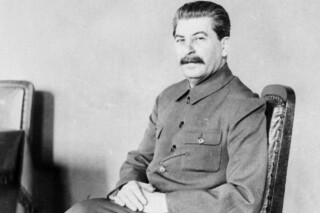Today in History: March 5, Stalin dies after long USSR reign

Soviet Premier Josef Stalin is seen, April 29, 1932. (AP Photo/James Abbe)
Today in History:
On March 5, 1953, Soviet dictator Josef Stalin died after three decades in power.
On this date:
In 1770, the Boston Massacre took place as British soldiers who’d been taunted by a crowd of colonists opened fire, killing five people.
In 1849, Zachary Taylor was inaugurated as the 12th president of the United States. (The swearing-in was delayed by a day because March 4 fell on a Sunday.)
In 1868, the impeachment trial of President Andrew Johnson began in the U.S. Senate, with Chief Justice Salmon P. Chase presiding. Johnson, the first U.S. president to be impeached, was accused of “high crimes and misdemeanors” stemming from his attempt to fire Secretary of War Edwin M. Stanton; the trial ended on May 26 with Johnson’s acquittal.
In 1933, in German parliamentary elections, the Nazi Party won 44 percent of the vote; the Nazis joined with a conservative nationalist party to gain a slender majority in the Reichstag.
In 1946, Winston Churchill delivered his “Iron Curtain” speech at Westminster College in Fulton, Missouri, in which he said: “From Stettin in the Baltic, to Trieste in the Adriatic, an ‘iron curtain’ has descended across the continent, allowing police governments to rule Eastern Europe.”
In 1963, country music performers Patsy Cline, Cowboy Copas and Hawkshaw Hawkins died in the crash of their plane, a Piper Comanche, near Camden, Tennessee, along with pilot Randy Hughes (Cline’s manager).
In 1970, the Treaty on the Non-Proliferation of Nuclear Weapons went into effect after 43 nations ratified it.
In 1979, NASA’s Voyager 1 space probe flew past Jupiter, sending back photographs of the planet and its moons.
In 1982, comedian John Belushi was found dead of a drug overdose in a rented bungalow in Hollywood; he was 33.
In 1998, NASA scientists said enough water was frozen in the loose soil of the moon to support a lunar base and perhaps, one day, a human colony.
In 2004, Martha Stewart was convicted in New York of obstructing justice and lying to the government about why she’d unloaded her Imclone stock just before the price plummeted; her ex-stockbroker, Peter Bacanovic, also was found guilty in the stock scandal. (Each later received a five-month prison sentence.)
In 2013, Venezuelan President Hugo Chavez, Latin America’s most vocal and controversial leader, died in Caracas at age 58 after a struggle with cancer.
In 2018, Los Angeles police arrested a man on charges that he stole Frances McDormand’s Oscar trophy after the Academy Awards a night earlier; the award was returned to the actress. (The charges would later be dismissed.)
In 2020, Palestinian officials closed the Church of the Nativity in Bethlehem over fears of the coronavirus. Officials ordered a cruise ship with 3,500 people aboard to stay back from the California coast until passengers and crew could be tested; a traveler from its previous voyage died of the coronavirus.
In 2021, California relaxed guidelines for reopening outdoor venues, clearing the way for fans to attend opening-day baseball games and return to Disneyland nearly a year after coronavirus restrictions shut down major entertainment spots.
In 2022, a promised cease-fire in the Ukrainian port city of Mariupol collapsed amid scenes of terror in the besieged town. The number of people fleeing the country reached 1.4 million just 10 days after Russian forces invaded.
